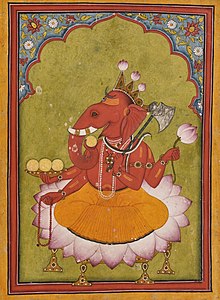မဟာပိန္နဲ
ပုံပန်းသွင်ပြင်
| မဟာပိန္နဲ | |
|---|---|
 | |
| နှီးနွယ်မှု | Deva, Brahman (Ganapatya), Saguna Brahman (Panchayatana puja) |
| ဘုံဗိမာန် | • Mount Kailash (with parents) • Swanandhlok |
| မန္တန် | Oṃ Ekadantaya Vidmahe,Vakrathundaya Dhimahi,Thanno Danthi Prachodhayat
Oṃ Shri Gaṇeśāya Namaḥ Oṃ Gaṃ Gaṇapataye Namaḥ |
| လက်နက် | Paraśu (axe), pāśa (noose), aṅkuśa (elephant goad) |
| သင်္ကေတများ | Swastika, Om, Modak |
| တောင် | Mouse |
| စာသား | Ganesha Purana, Mudgala Purana, Ganapati Atharvashirsa |
| လိင် | ကျား |
| ပွဲတော်များ | Ganesh Chaturthi, Diwali |
| ကိုယ်ရေး အချက်အလက် | |
| မိဘများ | |
| မွေးချင်း | Kartikeya (brother) |
| ကြင်ရာတော် | Riddhi and Siddhi or celibate |
| ညီမျှမှု | |
| Buddhists equivalent | Kangiten |

ဂနေရှ့် (သို့) မဟာပိန္နဲသည် ဟိန္ဒူဘာသာဝင်များ အများဆုံး ကိုးကွယ်ကြသည့်ဘုရားတစ်ပါးဖြစ်သည်။ ဟိန္ဒူဘုရားတစ်ပါး ဖြစ်၍ ဆင်ဦးခေါင်းဖြင့် အမှတ်အသားပြုသည်။ အခက်အခဲများကို ပယ်ရှားနိုင်သည်ဟု ယူဆ၍ အလုပ်အကိုင် တစ်ခုခု မစတင်မီ ပူဇော်လေ့ ရှိသည်။[၄] ဂနေရှ့်ဘုရားသည် လူကိုယ်နှင့် ဆင်ခေါင်းရှိသည်။ ဘုရားရှင်ဆင်းတုတော်များကို အိန္ဒိယနှင့် နီပေါနိုင်ငံတဝန်းတွင် တွေ့ရှိရသည်။ ထို့အပြင် ဂျပန်၊ အင်ဒိုနီးရှား၊ ထိုင်းနှင့် တိဘက်ရှိ ဗုဒ္ဓဘာသာဝင်များကလည်း ကိုးကွယ်ကြပြီး မောက္ခပေးနိုင်စေသည်ဟု ယုံကြည်ကြသည်။
ကိုးကား
[ပြင်ဆင်ရန်]- ↑ Heras 1972, p. 58.
- ↑ Getty 1936, p. 5.
- ↑ "Ganesha getting ready to throw his lotus. Basohli miniature, circa 1730. National Museum, New Delhi. In the Mudgalapurāṇa (VII, 70), in order to kill the demon of egotism (Mamāsura) who had attacked him, Gaṇeśa Vighnarāja throws his lotus at him. Unable to bear the fragrance of the divine flower, the demon surrenders to Gaṇeśha." For quotation of description of the work, see: တမ်းပလိတ်:Harvard citation no brackets.
- ↑ လှသမိန် (ဧပြီ ၁၉၇၈)။ "မဟာပိန္နဲ" (pdf)။ in စာပေစိစစ်ရေးကော်မတီ (ed.)။ ဗဟုသုတ စွယ်စုံ (ပထမအကြိမ် ed.)။ တောက်တောက်ဝင်း ပုံနှိပ်တိုက်၊ ရန်ကုန်မြို့။: ဇော်မော် စာပေ။
| ဤ ဟိန္ဒူဘာသာနှင့် ဆက်နွယ်သော ဆောင်းပါးမှာ ဆောင်းပါးတိုတစ်ပုဒ် ဖြစ်သည်။ ဖြည့်စွက်ရေးသားခြင်းဖြင့် မြန်မာဝီကီပီးဒီးယားကို ကူညီပါ။ |
